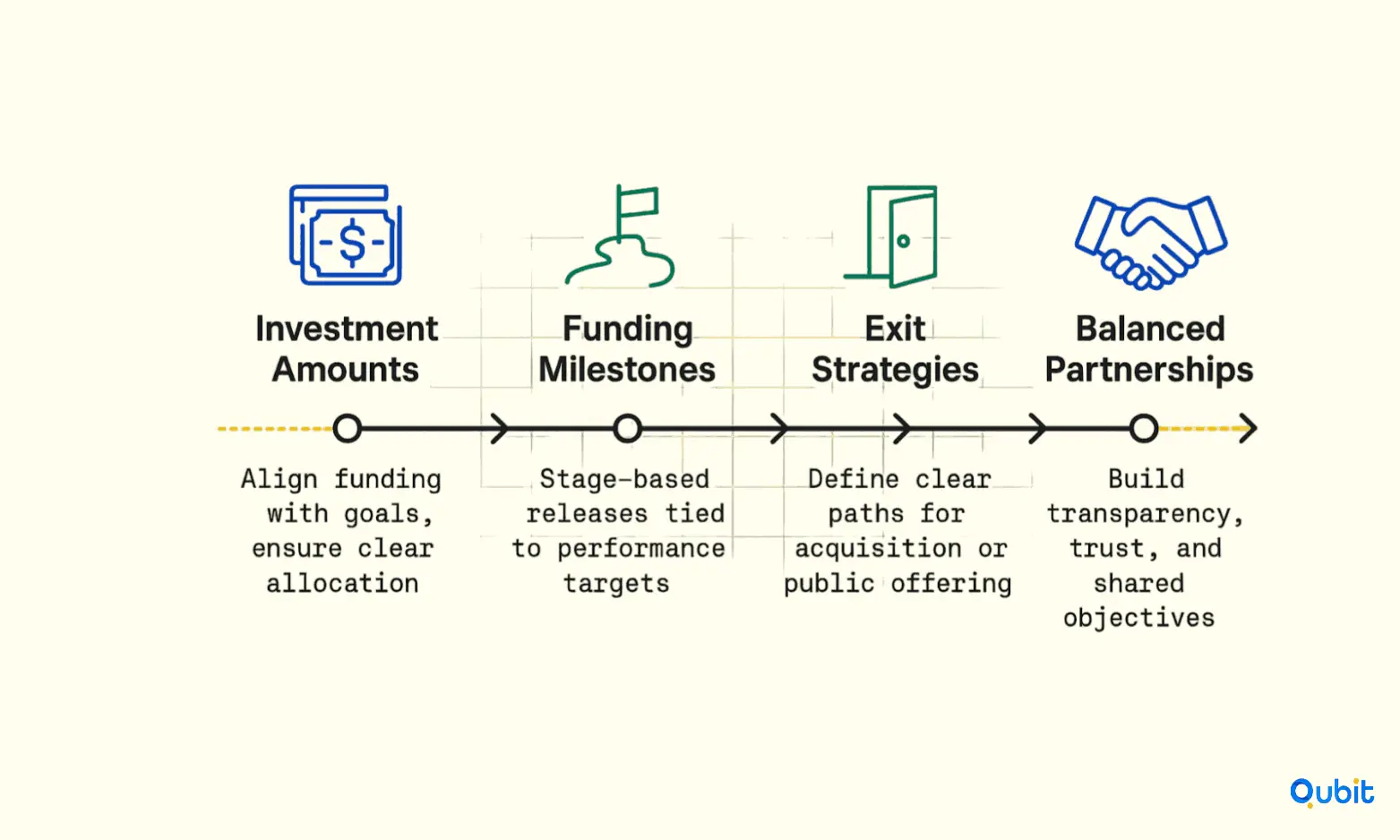Telecom ventures often require substantial funding to scale operations, develop cutting-edge technology, and expand market reach. Understanding the diverse funding instruments and investor types available is crucial for startups aiming to thrive in this competitive industry. From traditional venture capital to strategic partnerships, the landscape offers a variety of options tailored to the unique needs of telecom businesses.
Your analysis of funding instruments naturally extends to strategic corporate investment telecom, which highlights how collaboration with carriers and vendors offers an alternative perspective on resource allocation.
This blog aims to demystify these funding mechanisms while exploring how different investor profiles align with telecom-specific goals. Let’s dive into the details and uncover the strategies that can drive success in this dynamic sector.
Smart Selection: Choosing the Right Investors
Selecting the right investors is more than just securing funding, it’s about shaping the future of your company. Investors bring more than financial resources; they contribute strategic guidance, industry connections, and mentorship that can significantly influence your business trajectory. This makes it essential to choose partners whose vision aligns with your company’s mission and long-term goals.

An investor’s values and philosophy should resonate with your organization’s core principles. When there’s alignment, it fosters a relationship built on trust, ensuring both financial stability and sustainable growth. For instance, an investor who prioritizes innovation and ethical practices will be more likely to support decisions that uphold your brand’s integrity. Misaligned values, on the other hand, can lead to conflicting priorities and hinder progress.
Equally important is evaluating an investor’s engagement style. Some investors prefer a hands-on approach, offering frequent advice and actively participating in decision-making. Others may adopt a more passive role, providing support only when requested. Understanding their level of involvement helps you determine if their approach complements your team’s working style. This clarity is key to cultivating a productive and long-lasting partnership.
Comprehensive Guide to Investor Types in Telecom Ventures
Telecom ventures often require substantial capital to scale operations, develop innovative technologies, and expand market reach. Identifying the right investor type is crucial for aligning financial support with strategic goals. This guide explores the diverse investor profiles available to telecom startups, highlighting their unique advantages and potential risks.
Venture Capitalists: Driving High-Growth Potential
Venture capitalists (VCs) specialize in funding high-growth startups, making them a popular choice for telecom ventures aiming for rapid expansion. These investors typically provide substantial funding in exchange for equity, enabling startups to scale quickly.
Benefits:
- Access to significant capital for scaling operations.
- Strategic guidance from experienced professionals.
- Networking opportunities with industry leaders.
Risks:
- High expectations for growth and profitability.
- Potential loss of control due to equity dilution.
For telecom startups exploring alternative financing options, a review of available financing options reveals that venture debt telecom startups provides additional context on balancing capital efficiency with growth strategies for telecom ventures.
Angel Investors: Early-Stage Champions
Angel investors are individuals who fund startups during their early stages, often before they generate significant revenue. Their investments are typically smaller than those of VCs, but they can be instrumental in helping telecom ventures get off the ground.
Benefits:
- Flexible investment terms tailored to early-stage needs.
- Personalized mentorship and support.
- Quick decision-making compared to institutional investors.
Risks:
- Limited funding capacity for large-scale projects.
- Dependency on a single investor’s expertise and resources.
Private Equity Firms: Scaling Established Ventures
Private equity (PE) firms focus on established businesses with proven revenue streams, making them ideal for telecom ventures seeking to scale operations or restructure. These firms often invest significant capital and take an active role in management.
Benefits:
- Large-scale funding for expansion or restructuring.
- Operational expertise to optimize business performance.
- Long-term investment horizon compared to VCs.
Risks:
- Intensive involvement in decision-making processes.
- Pressure to deliver consistent returns on investment.
Strategic Corporate Investors: Industry-Specific Expertise
Strategic corporate investors are companies within the telecom industry that invest in startups to foster innovation and gain competitive advantages. These investors often bring industry-specific knowledge and resources to the table.
Benefits:
- Access to industry expertise and infrastructure.
- Opportunities for collaboration and partnerships.
- Alignment of strategic goals with the investor’s interests.
Risks:
- Potential conflicts of interest if goals diverge.
- Limited flexibility in operational decisions.
Matching Investors to Telecom Venture Needs
Understanding the unique characteristics of each investor type is essential for telecom ventures to secure the most suitable funding channel. While venture capitalists may prioritize rapid growth, private equity firms focus on scalability and operational efficiency. Similarly, angel investors and strategic corporate investors cater to specific stages of development and industry alignment.
Evaluating both financial backing and strategic guidance ensures that telecom ventures can select partners who align with their long-term objectives.
Evaluating Investor Expertise and Strategic Insights
Selecting the right investor is about more than just securing capital; it’s about aligning with individuals who bring industry expertise, a proven track record, and valuable mentorship. For telecom startups, this alignment can be the cornerstone of long-term success.
The Value of Industry Knowledge
Investors with deep connections in the telecom sector are uniquely positioned to anticipate market trends and shifts. Their understanding of the industry’s nuances, such as emerging technologies, competitive dynamics, and customer demands, can provide startups with a significant edge. These investors often have access to insider insights, enabling them to guide startups through challenges like technological disruptions or evolving consumer preferences. Their expertise ensures that startups are not just reacting to changes but proactively positioning themselves for growth.
Proven Track Records in Telecom Investments
An investor’s history speaks volumes about their ability to deliver results. Those with a strong portfolio of successful telecom investments bring credibility and confidence to the table. Their past successes often indicate a deep understanding of what it takes to thrive in the telecom space, from identifying high-potential opportunities to scaling operations effectively. This track record can also open doors to strategic partnerships and collaborations, as other industry players are more likely to trust and engage with investors who have demonstrated their ability to drive success.
For a broader understanding of funding strategies beyond investor selection, explore how to secure funding for telecom startups. This resource provides insights into comprehensive approaches that can complement your investor evaluation process.
Mentorship in Regulatory and Financial Matters
The telecom industry is heavily influenced by regulatory frameworks and financial complexities. Investors who offer expert guidance in these areas can be instrumental in helping startups navigate potential roadblocks. Whether it’s understanding compliance requirements, managing spectrum allocations, or optimizing financial structures, their mentorship can prevent costly missteps. This level of support often distinguishes investors who are merely financial backers from those who are true strategic partners.
Tools to Assess Investor Fit
To evaluate potential investors effectively, consider tools like the Advisor Quiz. This quick assessment helps you gauge your industry experience and identify potential advisory opportunities, ensuring that you align with investors who share your vision and goals.
By focusing on investors who combine industry expertise, a proven track record, and the ability to offer strategic mentorship, telecom startups can position themselves for sustainable growth and success.
Examining Financial Commitments and Partnership Terms
A well-defined financial framework is the cornerstone of any successful investment partnership. Investors’ contributions, structured funding milestones, and exit strategies must be carefully evaluated to ensure alignment with long-term goals and minimize risks. This section delves into these critical aspects, offering insights into how businesses can foster balanced and mutually beneficial collaborations.

Understanding Investment Amounts
The foundation of any partnership begins with clarity on the financial commitments involved. Investors typically contribute varying amounts based on the scope and scale of the venture. For businesses, it’s essential to assess whether the proposed investment aligns with their operational needs and growth objectives. Transparent communication about the allocation of funds ensures both parties remain on the same page, reducing potential conflicts.
For example, telecom companies have increasingly adopted Infrastructure asset monetization strategies to unlock capital. By divesting non-core assets like towers and fiber networks, they free up resources for reinvestment into core services. This trend highlights the importance of aligning investment strategies with broader business goals.
Structured Funding Milestones
A phased approach to funding can significantly reduce financial risks for both investors and businesses. Structured funding milestones—where capital is released in stages based on predefined performance metrics—create accountability and encourage steady progress.
This model benefits businesses by providing the flexibility to adapt to changing market conditions while ensuring investors see tangible results before committing additional funds. Milestones might include achieving specific revenue targets, completing product development phases, or expanding into new markets. Such structured agreements foster trust and mitigate uncertainties, paving the way for sustainable growth.
The Importance of Exit Strategies
Exit strategies are often overlooked but are vital for long-term planning. Investors typically have a clear vision of how and when they intend to exit the partnership, whether through acquisition, public offering, or other means. Understanding these intentions early in the collaboration helps businesses prepare for eventual transitions and ensures alignment with their strategic goals.
For instance, an investor planning to exit via acquisition may prioritize scaling the business rapidly to attract buyers. Conversely, an investor aiming for a public offering might focus on building a robust operational framework and brand reputation. By discussing exit strategies upfront, businesses can tailor their growth plans to complement the investor’s objectives, ensuring a smoother transition when the time comes.
Building Balanced Partnerships
Clear and mutually beneficial financial terms are essential for fostering balanced partnerships. Both parties should prioritize transparency, structured agreements, and open communication to address potential challenges proactively. When businesses and investors align their expectations, they create a foundation for collaboration that supports innovation, growth, and shared success.
Exploring Wireless Broadband Financing Options
Telecom companies face a pivotal decision when selecting financing options to fuel their growth and infrastructure development. With the U.S. broadband industry investing a staggering $94.7 billion in 2023, as reported by U.S. Telecom, the sector demonstrates robust capital flows and immense potential for expansion. However, the choice of funding depends heavily on a company’s financial profile, credit history, and long-term strategy.
Venture Capital: High-Risk, High-Reward
Venture capital offers telecom startups and growth-stage companies the opportunity to secure substantial funding in exchange for equity. This option is particularly attractive for businesses with innovative technologies or disruptive business models. While venture capital can provide the resources needed to scale rapidly, it often comes with significant equity dilution and oversight from investors. Companies must weigh the benefits of rapid growth against the potential loss of control over decision-making.
Angel Investment: Early-Stage Support
For smaller telecom ventures or startups, angel investors can be a valuable source of early-stage funding. These individuals typically invest their own money and may offer mentorship alongside financial support. Angel investment is ideal for companies that need smaller amounts of capital to validate their business model or develop initial infrastructure. However, the availability of angel investors may vary depending on the market and the perceived potential of the business.
Bank Loans: Stability and Predictability
Traditional bank loans remain a reliable financing option for telecom companies with strong credit histories. These loans offer predictable repayment terms and allow businesses to retain full ownership. However, they may not be suitable for startups or companies with limited financial records, as banks often require collateral and a proven track record. For established firms looking to expand their broadband infrastructure, bank loans can provide the stability needed for long-term projects.
Revenue-Based Financing: Flexible Growth Capital
An increasingly popular alternative is revenue-based financing, where companies receive growth capital in exchange for a percentage of future revenues. This model allows telecom businesses to scale without heavy equity dilution, making it an attractive option for ventures aiming to maintain control while accessing critical funds. By aligning repayment with revenue generation, this approach offers flexibility and reduces financial strain during slower periods.
Industry Investment Trends
The $94.7 billion invested by U.S. broadband providers in 2023 underscores the immense scale of funding flowing into the telecom industry. This figure, the second-highest annual capital expenditure in 22 years, highlights the sector’s commitment to expanding and upgrading infrastructure. Such substantial investments reflect the growing demand for high-speed internet and advanced wireless technologies, creating opportunities for companies to explore diverse financing options tailored to their needs.
Selecting the right financing option is a strategic decision that requires careful consideration of a company’s goals, financial health, and market position. Whether through venture capital, angel investment, bank loans, or revenue-based financing, telecom businesses have access to a variety of pathways to fuel their growth and innovation.
Spotlight: RevTek Capital's Telecom Investments
RevTek Capital has carved a niche in the financial world by offering revenue-based financing tailored specifically for technology and telecom companies. This innovative funding model is designed to provide businesses with the financial flexibility they need during critical growth phases, without the constraints of traditional equity or debt financing.
One of the standout features of RevTek’s approach is its focus on companies with a solid revenue foundation. To qualify, businesses must demonstrate a minimum monthly recurring revenue (MRR) of $25,000. This threshold ensures that the companies receiving funding are financially stable and positioned for sustainable growth. As a result, RevTek can provide targeted support that aligns with the unique challenges and opportunities faced by tech and telecom firms.
The impact of this funding model is exemplified by companies like Netsurit, which benefited significantly from RevTek’s support during a period of financial uncertainty. Their experience underscores the potential of revenue-based financing to bridge gaps and fuel growth for businesses in these dynamic industries.
RevTek Capital’s commitment to empowering technology and telecom ventures through innovative financing solutions continues to set it apart in a competitive market. By prioritizing recurring revenue and offering flexible terms, they enable businesses to focus on scaling operations and achieving long-term success.
Success Stories: Funding Over 27 Tech Entrepreneurs
Empowering technology entrepreneurs often begins with access to strategic funding. RevTek Capital has played a pivotal role in supporting over 27 tech innovators, enabling them to transform ideas into market-ready solutions. By providing targeted capital, these firms have helped entrepreneurs validate their market fit, ensuring their products resonate with consumer needs.
Collective funding efforts have sparked rapid innovation across the tech sector. Entrepreneurs who receive tailored financial support can focus on refining their offerings, scaling operations, and addressing industry challenges. This approach not only accelerates growth but also fosters a culture of creativity and problem-solving within the tech ecosystem.
The success stories of these 27 entrepreneurs highlight the importance of collaboration between funding partners and innovators. With the right resources, startups can overcome initial hurdles and unlock their full potential, driving progress in industries ranging from artificial intelligence to SaaS platforms.
RevTek Capital’s commitment to fueling innovation underscores the transformative power of targeted funding. By bridging the gap between vision and execution, they continue to empower entrepreneurs to redefine the boundaries of technology and create lasting impact.
Strategic Partnership: Partnering for Growth in Telecom
Collaborating with long-term investors can transform the trajectory of telecom businesses. These partnerships go beyond financial backing, offering strategic insights that help companies refine their vision and adapt to market demands. By fostering sustained relationships, businesses gain access to mentorship, operational expertise, and a network of resources that fuel growth.
Such alliances are instrumental in achieving long-term objectives, as they align investor goals with the company’s ambitions. This alignment ensures consistent support during pivotal moments, such as market expansion or technological upgrades. Moreover, the shared commitment to success creates a foundation for innovation and resilience in the competitive telecom industry.
Strategic partnerships also open doors to new markets, enabling businesses to scale efficiently while minimizing risks. Investors often bring industry-specific knowledge and connections that accelerate entry into untapped regions. By prioritizing collaboration, telecom companies can unlock opportunities that might otherwise remain out of reach.
This approach underscores the importance of viewing investors not just as financiers but as integral partners in growth.
Conclusion
Selecting the right investors and funding instruments is pivotal for the success of telecom ventures. Throughout this discussion, we’ve highlighted the importance of aligning investor expertise with your company’s growth objectives. Equally critical is securing financing through well-structured and transparent funding terms that support long-term scalability.
By focusing on these strategies, telecom startups can ensure that their financial partnerships not only provide capital but also add strategic value to their operations. If you're ready to elevate your telecom venture, we at Qubit Capital can help with our Fundraising Assistance service. Contact us today!
Key Takeaways:
- Telecom ventures require diverse funding instruments and tailored investor types.
- Aligning investor expertise with company vision is critical for sustainable growth.
- Structured funding terms with clear milestones and exit strategies minimize risks.
- Wireless broadband financing offers substantial growth potential, as highlighted by the $94.7 billion investment in 2023.
- Long-term investor partnerships not only provide capital but also strategic mentorship and market access.
Frequently asked Questions
What are telecom funding instruments?
Telecom funding instruments encompass a variety of financial tools tailored to the unique demands of telecom ventures. These include equity investments, debt financing, and revenue-based funding, each designed to support different stages of business growth and operational needs.


 Back
Back



